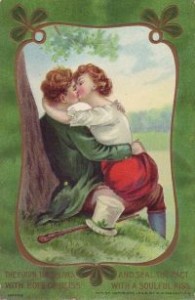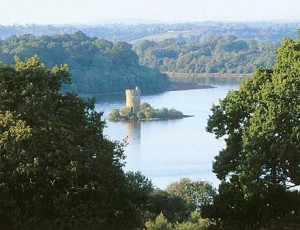 La melodia Buachaill Ón Éirne (Boy from the Erne) è una slow air diffusa nell’Irlanda del Nord. Eirne è traducibile sia come Erne, nome proprio di fiume, lago che (più impropriamente) come Irlanda.
La melodia Buachaill Ón Éirne (Boy from the Erne) è una slow air diffusa nell’Irlanda del Nord. Eirne è traducibile sia come Erne, nome proprio di fiume, lago che (più impropriamente) come Irlanda.
The Buachaill Ón Éirne melody (Boy from the Erne) is a slow air widespread in Northern Ireland. Eirne is translatable as both Erne, proper name of river, lake that (more improperly) as Ireland
Il testo in gaelico irlandese è ambiguo: nella prima strofa il ragazzo millanta la sua ricchezza lamentandosi che essa non potrà comprare l’amore. Nella seconda invita la ragazza a seguirlo per condividere con lui una vita avventurosa nei boschi, ma nella terza strofa rivela di preferire la bella vita (bacco, tabacco e venere) e quale cinico amante paragona il bacio di una donna ormai conquistata ad una scarpa vecchia da buttare via.
The Irish Gaelic text is ambiguous: in the first verse the boy makes the claim his wealth by complaining that it can not buy love. In the second he invites the girl to follow him to share with him an adventurous life in the woods, but in the third stanza he reveals to prefer the good life (bacchus, tobacco and venus) and as a cynical lover compares the kiss of a woman conquered by an old shoe to throw away.
Il brano è stato interpretato (seppure in versioni diverse) da molti gruppi o solisti della musica celtica tra i quali si citano: Clannad (1985), Corrs (2005) e Celtic Thunder (2011)
The piece has been interpreted (albeit in different versions) by many groups or soloists of Celtic music among which are cited: Clannad (1985), Corrs (2005) and Celtic Thunder (2011)
The Clannad
The Corrs
I
Buachaill ón Éirne mé is bhréagfainn féin cailín deas óg.
Ní iarrfainn bó spré léi, tá mé féin saibhir go leor
Is liom Corcaigh dá mhéid é, dhá thaobh an ghleanna, is Tír Eoghain,
Is mura n-athra’ mé béasaí, is mé an t-oidhre ar chontae Mhuigheo.
II
Rachaidh mé ‘márach a dhéanamh leanna fán choill
Gan choite, gan bád, gan gráinnín brach’ ar bith liom
Ach duilliúr na gcraobh mar éideadh leapa os mo chionn
‘S óró sheacht mh’anam déag thú ‘s tú ‘féachaint orm anall.
III
Buachailleacht bò, mo lao, nár chleacht mise ariamh
Ach ag imirt ‘s ag’ ol ‘s le hógmhná deasa fa shliabh
Má chaill mé mo stor ní dóigh gur chaill mé mo chiall
A’s ní mó liom do phóg ná’n bhróg atá’r caitheamh le bliain.
IV
A chuisle ‘s a stór ná pós an seanduine liath
Ach pós a’ fear óg, mo lao, mur’ maire sé ach bliain
Nó beidh tú go fóill gan ó nó mac os do chionn
A shilfeadh a’n deor tráthnóna nó’r maidin go trom.
| Traduzione Inglese I I’m a boy from the Erne (1) and I could charm a nice young girl. I would not ask for her wealth as I am rich enough myself. I own a good part of Cork, two sides of the glen in Tyrone And not to repeat myself, I’m the heir of County Mayo. II I will go tomorrow to make ale in the wood Without a cot, without a boat, without a pinch of gruel (2) with me But leaves of the branches as bedclothes over my head And think well done for you as you watch me from over there III A cowherd, my pet, I’ve never been accustomed to be Instead of playing and drinking with the nice young women On the mountain side Even though I lost my wealth it’s not as though I lost my senses And your kiss is no more to me now than a shoe worn for a year IV My darling and my love don’t marry the grey old man But marry a young man, my pet, if he only lives but a year Or you will be without a descendant to succeed you Who would shed their tears heavily at eve or at morn? |
Traduzione italiano Cattia Salto I Sono un ragazzo del lago Erne (1) e potrei sedurre una bella ragazza; non chiederei la sua dote perchè sono abbastanza ricco di mio, una parte di Cork è mia, ai due lati della valle di Tyrone. e non per vantarmi, ma sono l’erede della contea di Mayo. II Andrò domani a fare la birra nel bosco, senza una branda, senza una barca, senza un po’ di farinata (2) con me, solo le fronde degli alberi come riparo sopra la testa, e sarebbe una buona occasione per te d’incontrarmi da quelle parti. III Un mandriano (3), mia bestiolina(4), non sono abituato essere, preferisco giocare e bere in compagnia delle belle fanciulle sulla montagna; anche se ho perso la mia ricchezza non ho di certo perso la testa e il tuo bacio adesso non vale niente di più per me che una scarpa vecchia (5). IV Oh mia cara, amore mio, non sposare un uomo vecchio e grigio (6), ma sposa un uomo giovane, mia bestiolina, se lui vivesse solo un anno o se non potesse darti dei figli a succederti, chi piangerà per te notte e giorno? |
NOTE
1) si riferisce al lago Erne o al fiume omonimo, alcuni traducono erroneamente come ragazzo irlandese e l’errore comincia proprio con i Clannad
it’s refers to Lake Erne or the river of the same name, some mistakenly translate as an Irish boy and the mistake begins with the Clannad
2) gruel è quella pappetta per bambini (poverelli) che si mangiava un tempo sciogliendo la farina d’avena in acqua e sale (come per preparare una polentina un po’ molle), da non confondersi con il porridge (o brose) (vedi)
gruel is oatmeal in water and salt (as if to prepare a polenta), not to be confused with porridge (or brose) see
3) Buachailleacht è un giovane ragazzo addetto a sorvegliare il bestiame (mucche o pecore)
4) mo leo vezzeggiativo amoroso
5) letteralmente: una scarpa indossata da un anno
COME BY THE HILLS
Melodia tradizionale irlandese, testo di Gordon Smith (1960)
Traditional Irish melody, text by Gordon Smith (1960)
 Il giornalista scozzese Gordon Smith ha musicato la melodia di “Buachaill on Eirne”, facendone un’elegiaca promozione turistica della Terra d’Irlanda (o di Scozia) e un invito al carpe diem. Gordon Smith ha descritto Tir Na Nog, la terra dell’eterna giovinezza, sospesa in un tempo fatato tra terra e cielo, circondata dalle acque salvifiche, in cui il tempo è un’eterna primavera e la vita una bella canzone!
Il giornalista scozzese Gordon Smith ha musicato la melodia di “Buachaill on Eirne”, facendone un’elegiaca promozione turistica della Terra d’Irlanda (o di Scozia) e un invito al carpe diem. Gordon Smith ha descritto Tir Na Nog, la terra dell’eterna giovinezza, sospesa in un tempo fatato tra terra e cielo, circondata dalle acque salvifiche, in cui il tempo è un’eterna primavera e la vita una bella canzone!
The Scottish journalist Gordon Smith has played the melody of “Buachaill on Eirne”, making it an ambitious tourist promotion of Ireland (or Scotland) and an invitation to the carpe diem. Gordon Smith described Tir Na Nog, the land of eternal youth, suspended in a fairy time between earth and sky, surrounded by the waters of life, in which time is an eternal spring and life is a beautiful song!
In alcune versioni il brano inizia con la prima strofa in gaelico di “Buachaill on Eirne”.
In some versions the piece begins with the first Gaelic verse of “Buachaill on Eirne”.
Loreena McKennitt in Elemental (1985)
Damian MaGinty & Celtic Thunder (Tourism Ireland promotion)
I=IV Come by the hills to the land where fancy is free And stand where the peaks meet the sky and the rocks reach the sea Where the rivers run clear and the bracken is gold in the sun And cares of tomorrow must wait untill this day is done. II Come by the hills to the land where life is a song And sing while the birds fill the air with their joy all day long Where the trees sway in time, and even the wind sings in tune And cares of tomorrow must wait Untill this day is done. III Come by the hills to the land where legend remains where stories of old fill the heart and may yet come again where your past has been lost and the future has still to be won And cares of tomorrow must wait Untill this day is done. |
traduzione italiano di Cattia Salto I Vieni dalle colline alla piana dove l’immaginazione è libera e fermati dove le vette incontrano il cielo e gli scogli incontrano il mare. Dove i fiumi scorrono limpidi e la felce appare dorata al sole e il pensiero del domani deve aspettare finché l’oggi non è finito II Vieni dalle colline alla piana dove la vita è una canzone da cantare mentre gli uccelli per tutto il giorno riempiono l’aria con la loro gioia, dove gli alberi ondeggiano a tempo e anche il vento canta con te. E il pensiero del domani deve aspettare finché l’oggi non è finito III Vieni dalle colline alla piana dove resta la leggenda, e le storie del passato riempiono il cuore e possono ancora ritornare, dove il tuo passato è andato perduto e il futuro deve ancora arrivare. E il pensiero del domani deve aspettare finché l’oggi non è finito |
LINK
http://www.irishpage.com/songs/buachail.htm
http://mudcat.org/thread.cfm?threadid=30948
